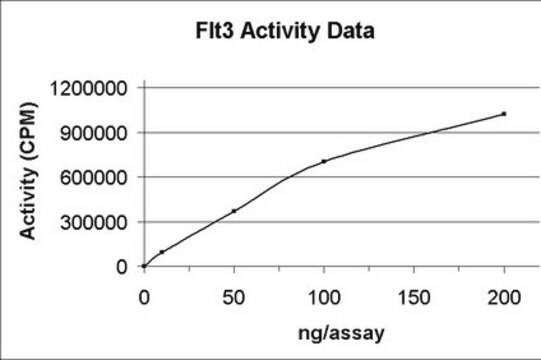OGS3423
PSF-CMV-PURO-COOH-FLAG® - C-TERMINAL FLAG® TAG MAMMALIAN PLASMID
plasmid vector for molecular cloning
Sinónimos:
cloning vector, expression vector, molecular cloning vector, plasmid, plasmid vector, snapfast vector, vector
About This Item
Productos recomendados
tag
FLAG® tagged
form
buffered aqueous solution
mol wt
size 6174 bp
bacteria selection
kanamycin
mammalian cells selection
puromycin
origin of replication
pUC (500 copies)
peptide cleavage
no cleavage
peptide tag location
C-terminal
promoter
Promoter name: CMV
Promoter activity: constitutive
Promoter type: mammalian
reporter gene
none
shipped in
ambient
storage temp.
−20°C
General description
About the Peptide Tag:This plasmid contains a c-terminal FLAG epitope tag that can be fused to a gene of interest to allow protein detection and/or purification. The sequence of the tag is: DYKDDDDK.
About the Cleavage Tag:This plasmid does not contain a protease cleavage site.
Promoter Expression Level: This plasmid contains the mammalian CMV promoter to drive gene expression. We have tested all of our mammalian promoters in a range of cell types and CMV is consistently the strongest in those we have studied. However there are many reports of the CMV promoter demonstrating silencing by methylation in long-term culture.
Sequence
Analysis Note
Legal Information
related product
Storage Class
12 - Non Combustible Liquids
flash_point_f
Not applicable
flash_point_c
Not applicable
Certificados de análisis (COA)
Busque Certificados de análisis (COA) introduciendo el número de lote del producto. Los números de lote se encuentran en la etiqueta del producto después de las palabras «Lot» o «Batch»
¿Ya tiene este producto?
Encuentre la documentación para los productos que ha comprado recientemente en la Biblioteca de documentos.
Nuestro equipo de científicos tiene experiencia en todas las áreas de investigación: Ciencias de la vida, Ciencia de los materiales, Síntesis química, Cromatografía, Analítica y muchas otras.
Póngase en contacto con el Servicio técnico



